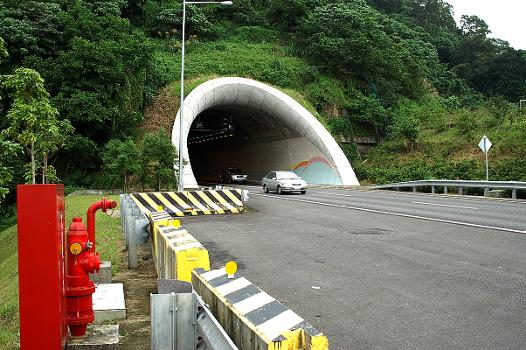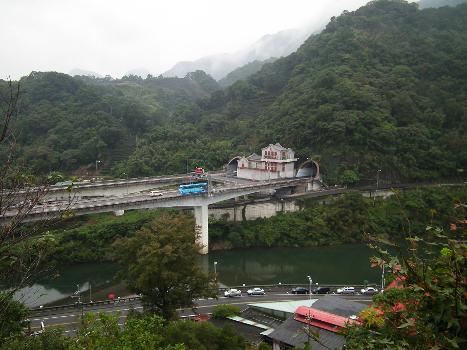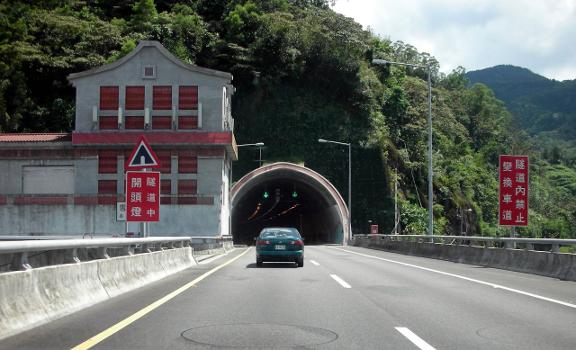General Information
| Name in local language: | 雪山隧道 (Xuěshān Suìdào) |
|---|---|
| Other name(s): | Pinglin Tunnel; Syueshan Tunnel; Xueshan Tunnel |
| Beginning of works: | 1993 |
| Completion: | 16 June 2006 |
| Status: | in use |
Project Type
| Structure: |
Tunnel |
|---|---|
| Function / usage: |
Road tunnel |
Location
| Location: |
New Taipei City, Taiwan Yilan, Taiwan |
|---|---|
| Coordinates: | 24° 50' 51.92" N 121° 47' 28.32" E |
| Coordinates: | 24° 56' 19.02" N 121° 42' 52.08" E |
Technical Information
Dimensions
| number of tubes | 2 | |
| tube 1 | length | 12 941 m |
| tube 2 | length | 12 917 m |
Design Loads
| design speed | 70-90 km/h |
Excerpt from Wikipedia
The Hsuehshan Tunnel (Chinese: 雪山隧道; pinyin: Xuěshān Suìdào) is the longest tunnel in Taiwan, located on the National Freeway 5. It opened on June 16, 2006.
Overview
The tunnels are bored through the Hsuehshan Range. The road connects Taipei through New Taipei to Yilan County, cutting down the journey time from two hours to just half an hour. It bypasses the rural district of Pinglin, which used to receive high traffic prior to the completion of the tunnel. One of the key aims of constructing the tunnel was to connect the western coast of Taiwan, where 95% of the population lives, to the eastern coast of the island and in doing so tackle the unbalanced development on the island. It is constructed with one pilot tunnel and two main tunnels for eastbound and westbound traffic. The total length is 12.942 km (8.042 mi), making the Hsuehshan Tunnel the ninth longest road tunnel in the world (fifth at the time of opening) and sixth longest in East Asia. The tunnel opened in June 2006 to severe traffic jams.
Tunnel Construction
Tunnel construction began in July 1991 and took 15 years to complete and cost a total of NT$90.6 billion (US$2.83 billion) to complete. Tunnel construction used 370,000 m³ (13,000,000 cu ft) of concrete, 2,000 kilometers (1,200 mi) of cables, and 2,000 lighting units.
While excavating the tunnel, engineers encountered difficult geological problems such as fractured rock and massive inflows of water, which caused severe delays. One of the three TBMs on the westbound tunnel was buried by a ground collapse. In order to speed up the tunnel boring, an additional working interface in Interchange Station No. 2 (under Ventilation Shaft No. 2) was built. Along the tunnel alignment, there are six major faults, ninety-eight fracture zones, and thirty six high-pressure groundwater sources. Hence, serious tunnel collapses with groundwater flooding took place periodically during tunnel construction. Altogether, 25 people died during 15 years of construction.
Operations
When traveling through the Hsuehshan Tunnel, vehicles must not exceed the 90 km/h (56 mph) limit; otherwise the drivers face a NT$3,000 (US$93.75) to NT$6,000 (US$187.5) fine. The usual minimum speed limit is 70 km/h. Additionally vehicles must maintain a separation distance of 50 m (164 ft) under normal situations. Even when the speed is less than 20 km/h (12 mph) due to congestion, a separation distance of 20 m (66 ft) must still be maintained. Double solid lines prohibit lane changes. Automated road-rule enforcement cameras are used to monitor speeders, tailgaters, and those who unlawfully change lanes. Announcements of zero tolerance of speeding meant that those traveling at 71 km/h would be fined. After creating controversies, effective 00:00 (UTC+8) on September 16, 2006, a tolerance of 10 km/h has been allowed so speeds up to 80 km/h are no longer automatically penalized.
The Hsuehshan Tunnel broadcasts a dedicated radio station on two FM channels inside the tunnel. Drivers can tune to either of the two FM stations to hear announcements regarding the Hsuehshan Tunnel, rules for driving inside the tunnel, and music.
As of May 1, 2008, the speed limit has been raised to 80 km/h with a 10 km/h tolerance. At this speed a trip through the 12.9 km tunnel takes 8.6 minutes.
As of Nov 1, 2010, the speed limit was raised to 90 km/h to allievate traffic
Tunnel information
- Tunnel length:
- Pilot tunnel: 12,941 m (8.041 mi; 42,457.349 ft)
- Main tunnels:
- Southbound tunnel: 12,917 m (8.026 mi; 42,378.609 ft)
- Northbound tunnel: 12,942 m (8.042 mi; 42,460.630 ft)
- Constructed by: RSEA
- Design speed: 70 km/h (Operational speed limit was raised to 90 km/h)
- Location: Pinglin District, New Taipei City and Toucheng Township, Yilan County
- Ventilation shaft: 3
- Total cost: NT$18,555,000,000 (US$562,273,000)
- Date of groundbreaking:
- Pilot tunnel: July 1991
- Main tunnels: July 23, 1993
- Date of breakthrough:
- Pilot tunnel: October 2003
- Main tunnels:
- Southbound tunnel: September 2004
- Northbound tunnel: April 2004
- Date of opening: June 16, 2006
Text imported from Wikipedia article "Hsuehshan Tunnel" and modified on February 10, 2023 according to the CC-BY-SA 4.0 International license.
Participants
Currently there is no information available about persons or companies having participated in this project.
Relevant Web Sites
Relevant Publications
- (2019): Analysis of smoke movement in the Hsuehshan tunnel fire. In: Tunnelling and Underground Space Technology, v. 84 (February 2019), pp. 142-150.
- (2017): Analysis of the Hsuehshan Tunnel Fire in Taiwan. In: Tunnelling and Underground Space Technology, v. 69 (October 2017), pp. 108-115.
- (2009): An approach to assessing the hydraulic conductivity disturbance in fractured rocks around the Syueshan tunnel, Taiwan. In: Tunnelling and Underground Space Technology, v. 24, n. 2 (March 2009), pp. 222-230.
- About this
data sheet - Structure-ID
20010970 - Published on:
13/12/2003 - Last updated on:
18/01/2023







